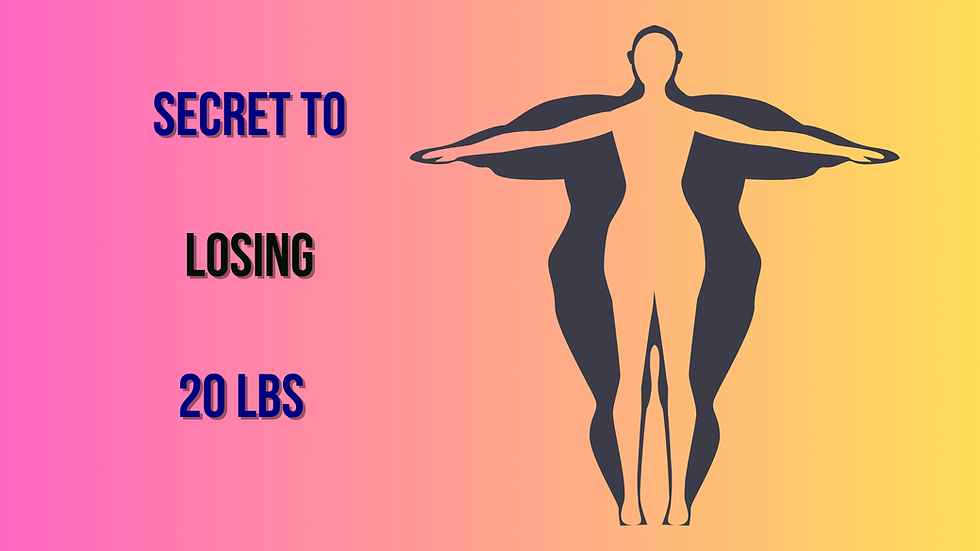How Long Does It Take To Lose 20 Pounds? – Part 2
- coreveinternationa

- Jan 17
- 3 min read

Welcome to the second installment of my ten-part video and blog series exploring the question, "How Long Does It Take To Lose 20 Pounds?" I'm thrilled to continue this journey with you as we uncover practical strategies, debunk myths, and explore the science behind healthy weight loss. If you missed the first part, we discussed Exercise-Focused Weight Loss and how incorporating regular cardio and strength training, along with healthy eating, can achieve this goal within 3-5 months.
For Part 2, I will be exploring The Role of Nutrition in Weight Loss. While exercise is undeniably important, nutrition is often considered the foundation of any successful weight-loss plan. The saying "You can’t out-exercise a bad diet" holds true, as the foods you consume play a crucial role in creating the calorie deficit needed to shed pounds.
We’ll dissect the importance of portion control, macronutrient balance, and mindful eating practices. Additionally, I’ll share how whole, nutrient-dense foods can keep you full and energized while supporting your weight-loss efforts. Stay tuned for accessible tips, meal ideas, and insights to help you take control of your diet and reach your 20-pound weight-loss goal in a sustainable way.
The Role of Nutrition in Weight Loss – Exploring Key Elements
When it comes to nutrition, achieving a sustainable calorie deficit is at the heart of losing weight. This doesn't mean starving yourself or going on extreme diets, but instead focusing on understanding the calories you consume versus those you burn. A practical way to begin is by calculating your Total Daily Energy Expenditure (TDEE), which gives you a guideline for how many calories your body needs daily to maintain its current weight. From there, you can create a modest calorie deficit—typically 500 to 1,000 calories per day—for gradual and healthy weight loss of about 1-2 pounds per week.
Portion control is another critical component that often gets overlooked. Many people unknowingly overeat portions that far exceed their calorie needs. By measuring dishes, understanding serving sizes, and avoiding oversized portions, you can better manage your intake without feeling deprived. For example, dividing your plate into sections—half for vegetables, a quarter for lean protein, and a quarter for whole grains—can help you visualize balanced meals that support weight loss.
Equally important is the balance of macronutrients—proteins, carbohydrates, and fats—on your plate. Protein is particularly beneficial, as it promotes satiety and helps preserve muscle mass as you lose fat. Incorporate lean sources of protein like chicken, fish, tofu, or beans. Carbohydrates, often misunderstood, are not the enemy when consumed mindfully. Opt for complex carbs like whole grains, fruits, and vegetables rather than refined or processed sugars. Healthy fats, found in foods like avocados, nuts, seeds, and olive oil, are essential for overall health and should be included in moderation.
Finally, adopting mindful eating practices can transform the way you relate to food. Rather than rushing through meals, take the time to eat slowly, savoring each bite. Pay attention to your hunger and fullness cues, and try to differentiate between emotional cravings and physical hunger. By practicing mindfulness, you can prevent unnecessary overeating and reduce the temptation to snack on empty-calorie foods.
This chapter of the series is all about empowering you to make informed nutritional choices that work for your lifestyle. Remember, weight loss is not about perfection, but consistency and balance. Armed with these nutritional strategies, you're one step closer to reaching your 20-pound weight-loss goal.
Stay tuned for Part 3, where we’ll address intermittent fasting as a strategy to support your weight loss journey. We’ll explore the different methods, their potential benefits, and how to determine if intermittent fasting aligns with your lifestyle and goals. Don’t miss this opportunity to learn how timing your meals can play a significant role in achieving sustainable results!
About the Author:
Steve, the CFO and online trainer at Coreve Health & Fitness Coaching, brings a wealth of experience and expertise to the table. With a background as a retired First Responder and Personal Trainer, Steve has a deep understanding of the importance of fitness and nutrition in achieving optimal health. In his previous role, he specialized in training police personnel, equipping them with the physical fitness required to compete for elite positions within the Department. Drawing from his extensive knowledge and passion for fitness, Steve now dedicates his time to providing online training and guidance, empowering individuals to reach their fitness goals and live a healthier lifestyle. With his unique background and commitment to helping others, Steve is a valuable asset to the Coreve Health & Fitness Coaching team.
For further information about health & fitness, contact us via our website for a free non-committal 30-minute consultation. Start your journey towards a healthier and fitter you today! https://www.corevefitness.ca/



Comments